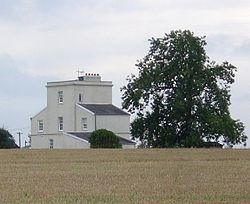Binsted
| Binsted | |
|---|---|
 Telegraph House, Binsted |
|
| Binsted shown within Hampshire | |
| Population | 1,871 |
| OS grid reference | SU770411 |
| Civil parish |
|
| District | |
| Shire county | |
| Region | |
| Country | England |
| Sovereign state | United Kingdom |
| Post town | ALTON |
| Postcode district | GU34 4 |
| Police | Hampshire |
| Fire | Hampshire |
| Ambulance | South Central |
| EU Parliament | South East England |
Binsted is a village and large civil parish in the East Hampshire district of Hampshire, England. It lies about 4.1 miles (6.6 km) east of Alton, its nearest town. The parish is one of the largest in northern Hampshire and covers almost 7,000 acres (2,800 ha). It contains two villages, Bucks Horn Oak and Holt Pound, as well as two hamlets, Wyck and Wheatley. The parish also covers the entirety of the Alice Holt Forest, a royal forest situated near the border with Surrey. The nearest railway station is 1.8 miles (2.9 km) northeast of the village, at Bentley. According to the 2011 census, the parish had a population of 1,817 people.
The village was first mentioned as being part of the Hundred of Netham at the time of the Domesday Survey in 1086. The history of Binsted from the 11th to 19th centuries is not documented, owing to its isolation and non-involvement in controversial activity. The parish has 58 Grade II listed buildings, and one Grade I building – the Church of the Holy Cross.
At the time of the Domesday Survey, Binsted was listed as part of the Hundred of Netham as well as the Manor of Alton Westbrook. The village was referred to as "Benested", which means "holding of land". Over the years there have been different variations on the spelling of the name, including Bensted, Benested and Boonsted (11th century), Bensted (14th century), and Bennsted (17th century). The name most likely has its origin from the Saxon word "bin", meaning "heap". Before the Norman Conquest, the village was known as "Binsted Popham" and was held by Egbert of Wessex. The existing parish church was built in approximately 1140 AD.
...
Wikipedia

